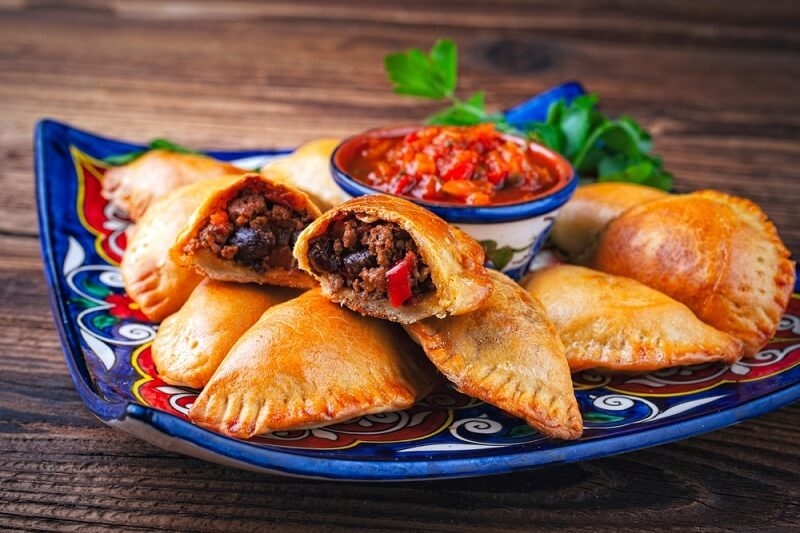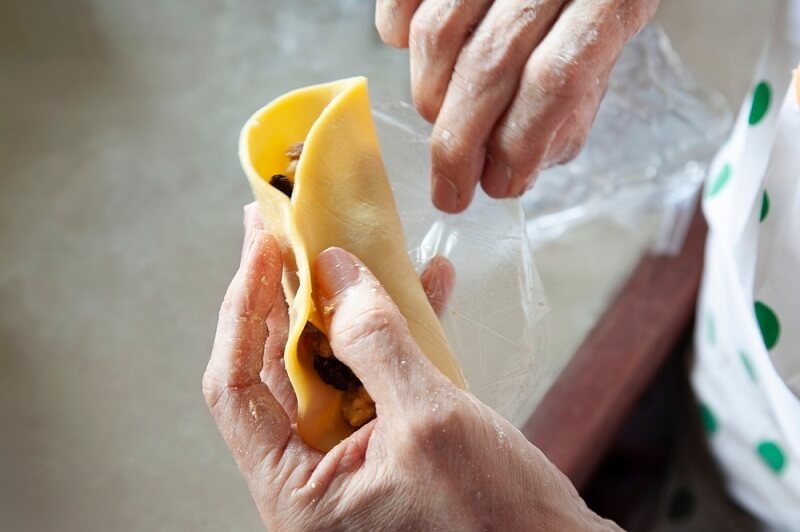
Few foods inspire comfort and feasts like empanadas. These crispy pastry pockets of savory or sweet joy are consumed in colorful markets in Spain and household kitchens in the United States. An excellent empanadas recipe combines basic ingredients with unlimited creativity, which makes it perfect for casual meals, celebratory gatherings, or grab-and-go snacks.
In this guide, we’ll dive deep into the origins of empanadas, Spanish beef empanadas, and an easy empanada dough recipe. We will explore filling variations and compare baked vs fried empanadas. You’ll also learn about their cultural importance as one of the most authentic Spanish pastries and discover why they continue to win hearts across the world.
Empanadas were born in Spain, in the Galicia region. Empanadas were previously baked as giant pies, cut into portions to share. Through time, they turned out to be what they are today: portable pastries perfect for workers, travelers, and immigrants in transit.
Then the Spaniards went to America and took their recipes with them. Each region put its own spin on it. Argentina developed its own beef empanadas, which were juicy and meaty; Chile added olives and boiled eggs, and Caribbean flavors burst with seafood stuffing. But the core of every empanada recipe is the same: a flaky pastry that contains a tasty filling.
One of the reasons empanadas are so popular is that they can be used in a variety of ways. They can be served hot or cold, as an appetizer or as a main dish, and can be made in savory or sweet varieties.
Portable: Easy to pack for school, work, or travel.
Flexible: The dough is baked or fried based on your preference.
Crowd-Pleasing: A batch can feed a crowd with minimal fuss.
Customizable: From Spanish beef empanadas to vegetarian and dessert options, the possibilities are endless.
If you’re looking for a dish that works for weeknight dinners, weekend parties, or holiday spreads, this empanadas recipe delivers every time.
In the center of each empanada is dough. Store-bought crusts in a pinch work, but homemade dough is unbeatable for flavor and texture. Luckily, an easy empanada dough recipe contains only a handful of ingredients that typically sit in the pantry.
Ingredients:
Instructions:
This dough is flaky, tender, and versatile. It is perfect for both sweet and savory fillings, so it is the perfect foundation for any empanadas recipe.

Among all the variations, Spanish beef empanadas are timeless classics in every way. The savory beef filling and the tender crust contain everything people love about Spanish cuisine.
Ingredients for Filling:
Procedure:
This mixture is rich, well-flavored, and intensely satisfying. No wonder Spanish beef empanadas tend to be the first version people attempt when they learn how to make them.
Once you have the dough and filling ready, assembly is a breeze.
Roll the Dough: Roll the dough on a floured surface to about ? inch thick. Cut into circles about 4–6 inches in diameter.
Fill and Seal: Place 2 tablespoons of filling in the center, fold in half moon fashion, and seal edges with fork or old-fashioned crimping.
Choose Your Cooking Method: This is where the debate rages on, of baked or fried empanadas.
Baked: Egg wash for a golden crust and bake in a 375°F oven for 20–25 minutes.
Fried: Heat oil to 350°F and fry empanadas 3–4 minutes until golden brown.
Both methods produce tasty outcomes. Fried empanadas are crunchier and better for big batches, but baked empanadas are more convenient and lighter. The option is yours.
The most interesting thing about empanadas is that you can be so creative with them. With the basic technique down, you can play with a multitude of empanada filling ideas.
Chicken and Cheese: Shredded chicken with mozzarella or cheddar.
Spinach and Feta: A vegetarian version with a Greek twist.
Chorizo and Potato: Smoky and rich, good for a cold winter night's dinner.
Seafood Mix: Shrimp, cod, or tuna with lemon zest and herbs.
Sweet Options: Apple-cinnamon, guava and cream cheese, or banana and Nutella.
With some experimentation of various empanada filling ideas, one can adapt this dish to be suited to any occasion, even brunch to dessert.
Whether to go for baked versus fried empanadas is more than just about the method; it's about tradition, style, and flavor.
Baked Empanadas:
Some chefs switch between the two based on the occasion. For a weeknight family dinner, convenient is baked. For special events, fried is the star.
While empanadas are enjoyed across the globe, they remain deeply Spanish in their origins. Large empanadas with tuna, sardines, or pork, cut to be served at parties were typical in Galicia. Over the course of centuries, the concept developed, but the Spanish origins cannot be confused.
Whenever you take a bite of an excellent empanada, you're not just tasting something-you're savoring one of the most authentic Spanish flaky pastries ever invented. They are a testament to the way food can travel throughout the world, transform in its travels, and still be itself.
Chill your dough every time before rolling for ease.
Another reason to love empanadas is how nicely they adapt to zany schedules. Both filling and dough can be pre-made.
Freezing Uncooked Empanadas: Assemble, freeze on a tray, then store in freezer bags. Bake or fry straight from frozen.
Freezing Cooked Empanadas: Let them cool before freezing. Reheat in the oven until hot and crisp.
This make-ahead flexibility ensures you’re never far from a batch of delicious hand pies.
Empanadas can really hold their own, but when served alongside sides and sauces, they are at their best. Good ones to pair with empanadas include Spanish rice, salad, or roasted vegetables. To add brightness to dip into, chimichurri is great, while aioli adds cream, and salsa adds a fresh splash. This empanadas recipe can be served as an appetizer, main dish, or even dessert-it really all depends on your table.
Empanadas represent all our best cooking: tradition, flavor, and imagination. Simple empanada dough recipe plus your favorite filling provide the key to unlimited options. From Spanish beef empanadas' warm comfort to innovative vegetarian or dessert versions, there's a hand pie to suit every desire.
The baked or fried empanada war will continue, but the best news is that they are delicious either way. And because one of the oldest Spanish sweets, empanadas possesses a cultural heritage that gives every bite significance.
So the next time you're craving to surprise your family, impress guests, or simply reward yourself, turn to this empanadas recipe. These pie-sized pastry pockets are easy to make, infinitely versatile, and entirely suited to any occasion that might arise.
This content was created by AI